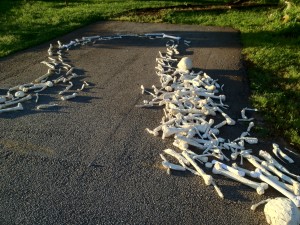Academe of the Oaks students use technology and art to connect with youth in the Democratic Republic of the Congo
 Tucked away here in East Decatur Station, students from Academe of the Oaks are Skyping with youth a world away in the Democratic Republic of the Congo (DRC). Over a series of video conferences facilitated by the Global Nomads Group, Academe students learned about the civil wars, genocide and strife in the DRC -not through text books or videos- but by talking directly to kids who are living through the harsh reality of war. Conversations between the groups of students have ranged from intense discussions about the difficulty of living in a war torn country, economics, the universal challenges of adolescence to simply finding reasons for laughter.
Tucked away here in East Decatur Station, students from Academe of the Oaks are Skyping with youth a world away in the Democratic Republic of the Congo (DRC). Over a series of video conferences facilitated by the Global Nomads Group, Academe students learned about the civil wars, genocide and strife in the DRC -not through text books or videos- but by talking directly to kids who are living through the harsh reality of war. Conversations between the groups of students have ranged from intense discussions about the difficulty of living in a war torn country, economics, the universal challenges of adolescence to simply finding reasons for laughter.
“Global Nomads is about bringing students together in different situations and understanding each other better,” says Victoria Smith, an 11th grade Academe student. “It’s about realizing that we are all still kids no matter what country we live in, whether it’s a war-torn country or capitalist America.”
With guidance from teacher and Peace Corps veteran Jim Kasper and school director Eva Handschin, Academe students were inspired by their conversations to participate in the One Million Bones Project. The project is part of an international effort to build awareness of the atrocities taking place in the DRC, Sudan, Burma and Somalia. Participants create bone replicas with paper tape and glue as a part of a powerful art installation to represent those who have lost their lives due to political and civil strife in these affected countries.
The Academe students created over 700 bones temporarily displayed at the Academe of the Oaks entrance in East Decatur Station. These handcrafted bones will contribute to a national 3 day installation on the National Mall from June 8- 10. For each bone created $1 is donated to CARE International up to $500,000.
Both the Global Nomads Group and the One Million Bones Project align well with the Academe of the Oaks mission to instill a sense of ethical responsibility, global awareness, critical thinking and resourcefulness among the students. In the process, they have acquired valuable attributes which will follow them into adulthood: empathy, awareness and as Victoria puts it- the desire to “feel useful, be useful, be a part of something.”
We can’t wait to see what these remarkable kids come up with next!




